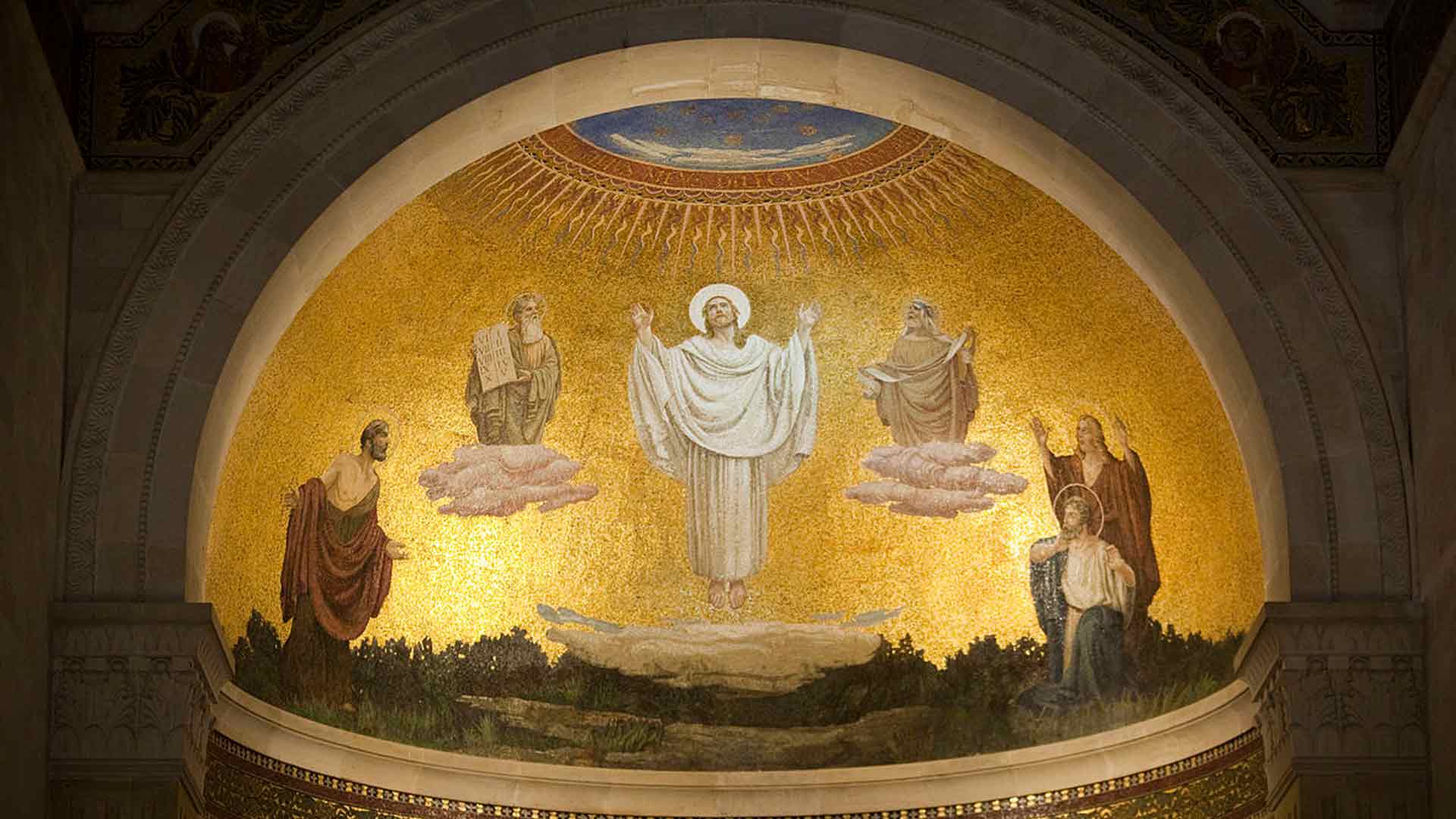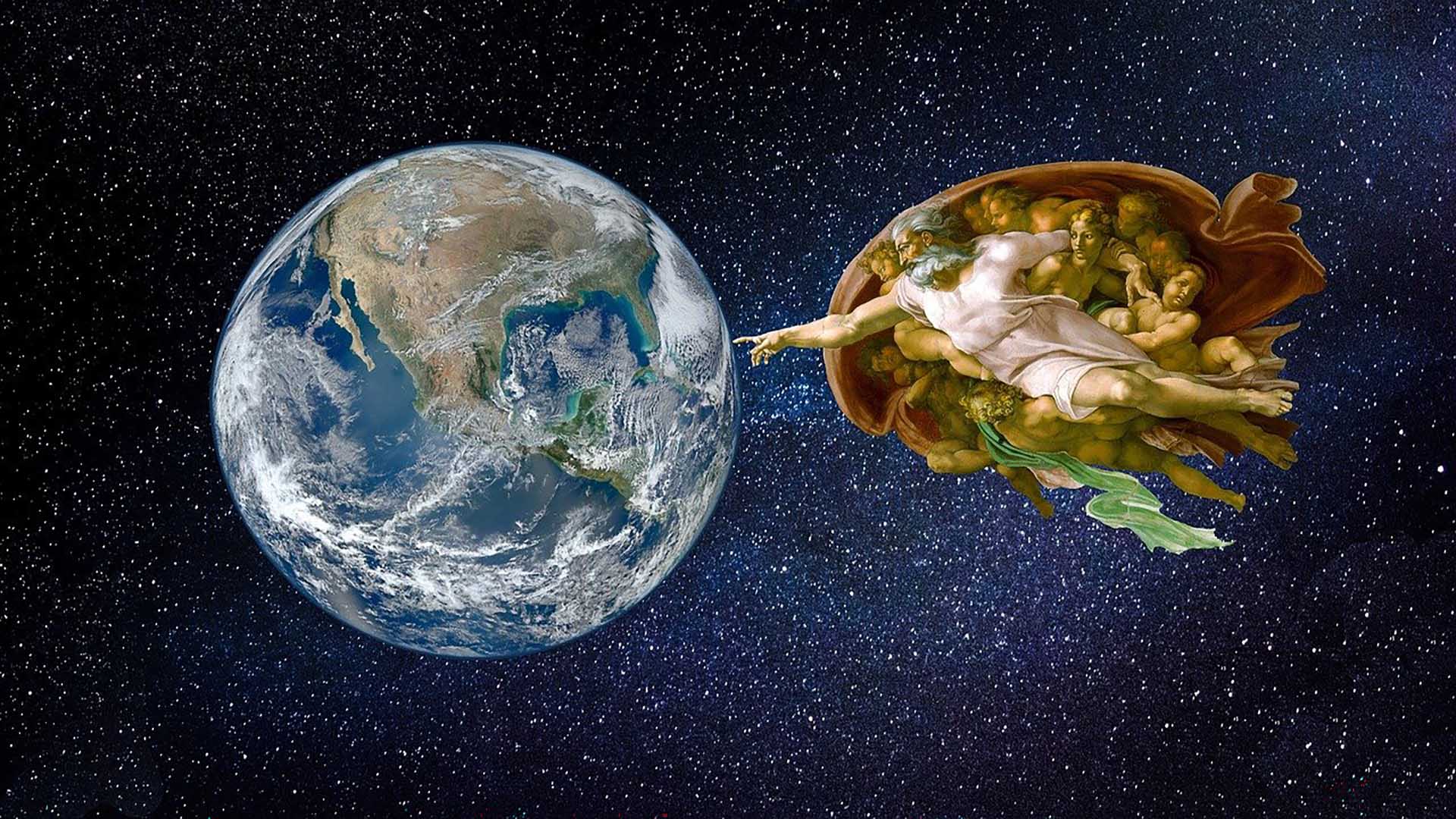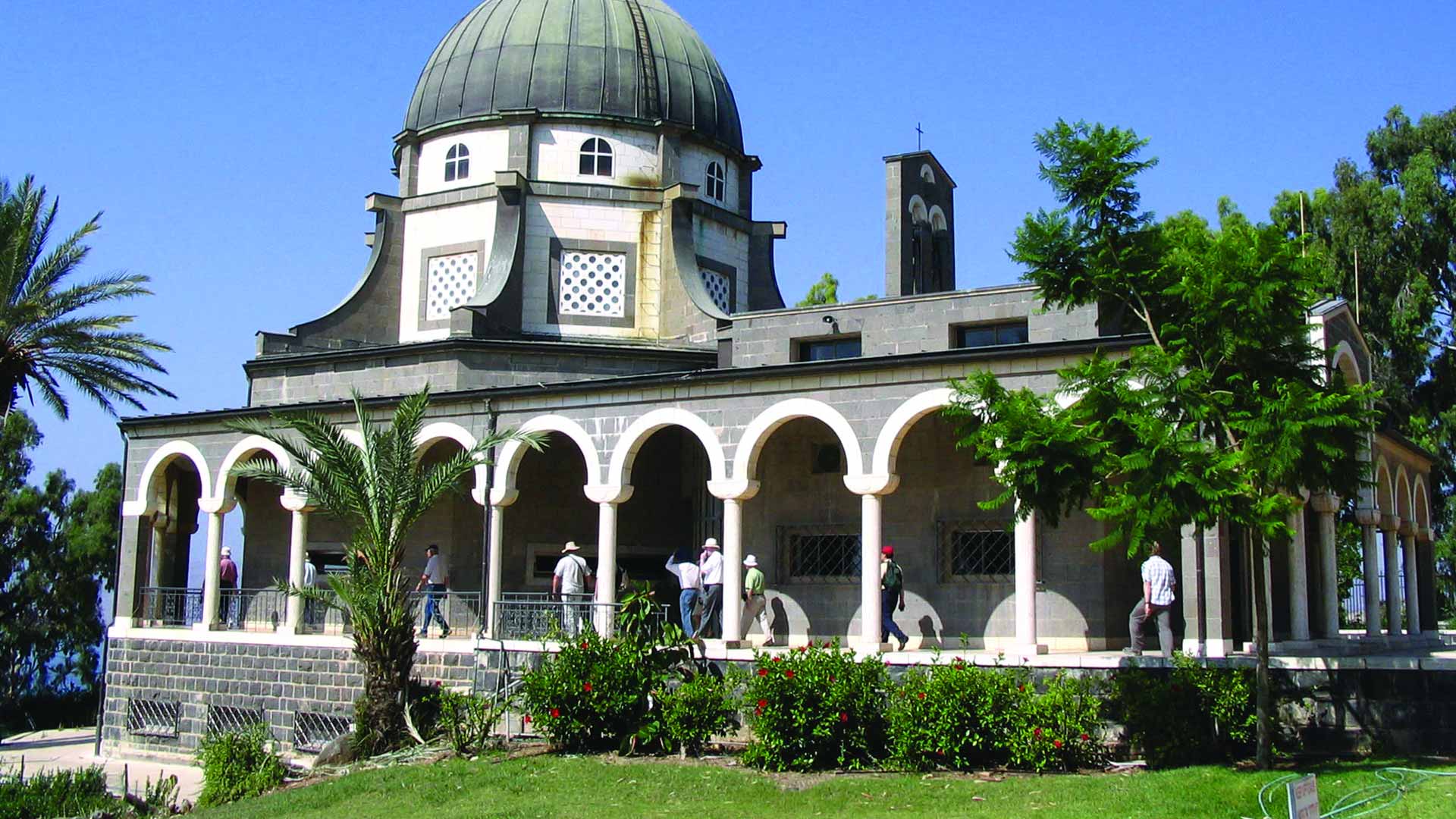Our Cause of Rejoicing
Perhaps no other parable is as striking and moving as the Parable of the Prodigal Son. It is the third and last of a set of parables on mercy. The two that precede it are the parables of the Lost Sheep and of the Lost Coin. While these two represent a sinner’s search for the Heavenly Father, the story of the Prodigal Son shows how the Father searches for and receives a contrite sinner – not commending his sins, for sure, but forgiving them. That is why the parable strikes a chord with everyone.
The Parable has been variously titled the ‘Parable of the Two Brothers’ or ‘Two Sons’ or yet the ‘Lost Son’. But that is to look merely at the human side of the story. By thus limiting its scope we are likely to turn a deaf ear to the true message of what is by now a very familiar tale. So, it is hugely important that we look at it as a harbinger of hope and joy.
Hope and joy cannot spring from, or be sustained by, human endeavours alone. For instance, despite the inherent drama of the parable in hand, it would be just another story if divested of its divine radiance. It is, therefore, not farfetched to alternatively title it the ‘Parable of the Loving Father’ or of the ‘Forgiving Father’ – or even of the ‘Prodigal Father’, in the best sense of the term, that is, one who loves bountifully! After all, divine love and forgiveness are ever-fresh even two millennia after Jesus made it known.
The present parable tells of the younger of the two sons who, by demanding the share of inheritance due to him, infringed tradition and offended his father. He squandered his wealth in loose living and, only when in dire straits, retraced his steps, mentally prepared to work as a servant in his father’s house. Much against his expectation, his father not only welcomed him with open arms but also treated him as a beloved son – as if nothing had happened. No doubt the mother is sorely missing from the scene; but perhaps that is only to show her love is encompassed in God's omnipotent goodness.
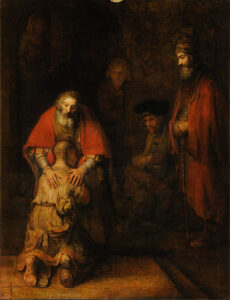
It is obvious that the young man considered that he deserved stringency, not mercy. On the other hand, Pope John Paul II, in his encyclical Dives in Misericordia, says that his father’s joyful response indicates that ‘even if he is a prodigal, a son does not cease to be truly his father's son; it also indicates a good that has been found again, which in the case of the prodigal son was his return to the truth about himself.’
What a soul-stirring finale that would have made except that the elder brother literally spoilt the party. On the face of it, he was not wrong. Had not the Benjamin received his share and left the father’s house merry as a bird? Had not his actions disgraced the family? While this is undeniable, is it not equally true that the habitually decorous elder brother was now being self-righteous, resentful, selfish, jealous, and merciless? He may have adhered to the letter of the law, but not its spirit!
We can identify ourselves with the Parable because we are like either of the sons. The Encyclical notes that the younger son ‘in a certain sense is the man of every period, beginning with the one who was the first to lose the inheritance of grace and original justice.’ We may smugly condemn the younger one – he has done something awful that none can accuse us of! We do not forget his flaws, much less appreciate his regrets. We fail to thank God that no such slip-up has landed us in a bad situation. We fail to realise that we ‘all have sinned and fallen short of the glory of God’.
The good news is that we can change it for the better if we walk back towards our father – the only perfect character in the Parable. He was sinned against by both his sons, but holds it not against them. He represents God the Father who is always happy to find His lost sons – you and me; and to call upon others – symbolised by the elder son – to partake of that joy. The Parable is a fitting response from Jesus to those who had criticised Him for accepting tax collectors and other public sinners at His table. But then, had God kept a record of our sins, who would survive? So, let’s go ahead and ‘forgive those who have sinned against us.’
That God treats us with love and mercy calls for great rejoicing; it is a crowning of our poor little spiritual journey. That is why the fourth Sunday of Lent is called Laetere Sunday, from the words ‘Laetare Jerusalem’ (‘Rejoice with Jerusalem’, Is. 66:10) in the Latin introit for the Mass of the day. This is a refreshing change in the midst of the sombre mood of Lent. That the Gospel has revealed the Father’s infinite love and mercy and the possibility of our reconciliation with Him and our neighbour is the ultimate reason for our joy.
Três poemas de R. V. Pandit
À espera de Rama
As minas Fizeram de Goa Não sei o quê. As pedras Em ouro transformadas? Não sei. Mas uma coisa eu sei – Homens, que anos atrás Eram de oiro, Hoje estão feitos pedras Como a Ahilia[1] À espera de Rama!!
Inimigos pela língua?
Tu e eu Irmãos somos… Inimigos tornámos23 Por causa da língua!
O Goês
Homem de Goa Tu és como a jaca Com uma coroa de espinhos Como Jesus Cristo. Mas por dentro são bagos Cheios de mel, de amor. Tu és assim! Tu és assim Ó homem de Goa.
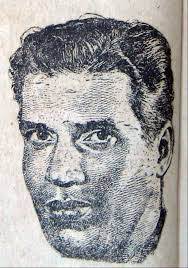 A poesia de Raghunath Vishnu Pandit (1917-1990), conhecido como R.V. Pandit, é caracterizada pelo uso do verso livre; e, pela objectividade no tratamento do assunto e economia da linguagem, torna-se, às vezes, aforística.
A poesia de Raghunath Vishnu Pandit (1917-1990), conhecido como R.V. Pandit, é caracterizada pelo uso do verso livre; e, pela objectividade no tratamento do assunto e economia da linguagem, torna-se, às vezes, aforística.
Escreveu os seguintes livros de poesia: Ailem toxem gailem [Cantei tal como senti]; Mhojem utor gavddiachem [Falo tal como um gauddi[2]]; Urtolem tem rup dhortolem [Formas que ficam]; Dhortorechem kavan [Cântico da terra]; Chondravoll [A Lua][3]; e, mais tarde, Reventlim Pavlam [Passos na areia], Lharam [Ondas], além de livros de prosa. A sua obra demonstra entranhado amor a Goa e marcado interesse pelo bem-estar dos extractos mais desfavorecidos da sociedade goesa.
Dedicando-se ao estudo do folclore, publicou dois volumes de histórias tradicionais concanins – Gôdd gôdd kanniô [Contos doces] – e uma versão para crianças de alguns episódios do Ramaiana e Mahabarata. Em 1975, o seu livro Doriá Gazota [O Rugir do Mar] ganhou o prémio da Sahitya Akademi (Academia indiana de Letras). Em 1982, foi recipiendário do galardão Padma Shri do Governo da Índia.
Como fotógrafo amador, Pandit captou de forma excepcional a vida de Gandhi, de quem era sequaz. Foi sócio efectivo do Instituto Menezes Bragança, em Goa, e recebeu o grau de doutor honoris causa de três universidades.[4] É um dos poucos poetas da língua concani e marata com obras traduzidas em português e inglês.[5]
Segundo A Literatura Indo-Portuguesa,[6] de Vimala Devi e Manuel de Seabra, os poemas de Pandit eram vertidos para português pelo próprio; no entanto, todos que encontrámos são da tradução de Mucunda Quelecar[7]; e a tradução inglesa da autoria de Thomas Gay[8]. Na transliteração para caracteres romanos dos seus poemas, que escrevia em devanagárico, teve a ajuda do jornalista Felício Cardoso.[9] E a tradução livre transforma-nos todos em novos poemas.
As três peças que figuram acima tratam de temas candentes do período pós-1961:
O primeiro poema refere-se à transformação da vivência goesa na sequência da exploração das minas de ferro e manganês, a que se procedeu, vigorosamente, a partir dos anos sessenta do século XX. Só após algumas décadas é que o território se apercebeu das nefastas consequências da actividade mineira.
O segundo é um poemeto com um quê de autobiográfico, pois no movimento que precedeu ao histórico Opinion Poll (escrutínio da opinião), em 1967, Pandit bateu-se pela integração de Goa no estado vizinho do Maharashtra de língua oficial marata. Foi por isso hostilizado por escritores goeses da língua concani que eram a favor de estatuto político independente para Goa dentro da União Indiana.[10] Essa rotura com os “irmãos” do idioma goês ter-lhe-ia inspirado esse poemeto.
O terceiro poema é o seu cântico de louvor à índole do povo goês.
--------------------------------------------------------------------------------------------------------------------------------
[1] Ahilia petrificou-se quando amaldiçoada pelo marido Gautama, tendo mais tarde mudado de estado com um simples toque dos pés de Rama, príncipe de Ayodhya e herói do poema épico Ramaiana.
[2] Os gauddi, considerados os mais antigos habitantes de Goa, provêm da raça proto-australóide.
[3] Edições de autor, publicadas no mesmo dia (26 de janeiro de 1963), em Goa.
[4] Embora a sua habilitação académica não passasse do bacharelato em Letras (B.A.), recebeu esse reconhecimento de universidades filipina, brasileira e americana (Cf. António Pereira, The Makers of Konkani Literature (1982), p. 230; Konkani Vishvakosh, Vol. II, p. 629).
[5] Voices of Peace (Goa, 1967) e The Tamarind Leaf (Goa, 1967). Os seus poemas em tradução portuguesa estão compilados nos n.ºs 119 (1978), 122, 123 (1979) do Boletim do Instituto Menezes Bragança.
[6] Lisboa: Junta de Investigações do Ultramar, 1971.
[7] Segundo informações prestadas por Madhav Borcar, poeta goês da língua concani, Mucunda Quelecar (1904-?) (vulgo Mukund[a] Kelekar) tinha conhecimentos profundos do concanim, português, francês, latim e inglês. Escrevia regularmente para O Heraldo e A Vida e, em inglês, para The Navhind Times. Foi professor de português e de matemática num liceu particular em Pangim. Traduziu para o concani os contos de Stefan Zweig.
[8] Thomas Gay, de nome completo, Thomas Edward Waterfield Gay (1905-2001) (sendo este último o apelido de sua mãe, adoptado em 1955), alto funcionário do Quadro dos serviços civis britânicos na Índia (Indian Civil Services, ICS). Segundo nos disse Borcar, Gay limava os poemas traduzidos por Pandit em inglês.
[9] Informação prestada por Borcar. O contista e jornalista Felício Cardoso (1932-2004) lançou as bases da nova sintaxe do concani, no período do pós-1961. O seu jornal Sot fundiu-se com o diário A Vida, formando, mais tarde, o jornal Divtti, de que Cardoso foi director associado.
[10] Informação prestada pelo padre Mousinho de Ataíde.
Reconhecimento: Publicado na Revista da Casa de Goa, Lisboa, Série II, No. 13, Novembro-Dezembro de 2021
Encounter with God
The Gospels of the first two Sundays of Lent were devoted to the Temptation in the Desert and the Transfiguration: in the former, the Son of God laid bare His spiritual fibre, while in the latter, the Father expressed His total trust in His Son. Convinced that we have seen the True God, we today focus on the need for an ever-closer encounter with Him.
God has chosen you and me to follow Him; it is up to us to respond. Moses did so by approaching the burning bush; and on behalf of doubting Thomases of all times, he bade God to better identify Himself. God called Himself ‘I am’ – employing a simple but remarkable verb that pinpoints the core of existence. Closer to our times, French philosopher Descartes famously declared, ‘I think, therefore I am’; which A L Thomas presented as: ‘I doubt, therefore I think, therefore I am.’
Be that as it may, God’s description strikes much deeper: ‘I am who I am.’ You can’t push the boundaries any further. That is because God was present at the beginning of time; He is present now, and ever shall be. In fact, He it is who made Time with a capital T – and, very tenderly, still makes time for us every day! He revealed His greatness and transcendence to Moses but was never aloof. On the contrary, sensitive to the problems of the Israelites, He liberated them from their desperate situation in Egypt.
But if you’ve been wondering why He doesn’t do the same in our day and age – see how criminals have a field day, and despots, none to question them! – be sure that God has not abdicated his responsibilities; He is in our midst and keeps His promises. Chances are we fail to see God in everyday happenings – in the bustle of lives, we hardly make time for Him!
Jesus is the new and greater Moses. He is the Son of God who has spoken to modern man. He is the ‘I am’ variously qualified: ‘I am the Bread of Life,’ He said; ‘I am the Light of the World’; ‘I am the Door’; ‘I am the Good Shepherd’; ‘I am the Resurrection and the Life’; ‘I am the Way and the Truth and the Life’; ‘I am the Vine’. He is indeed the Messiah, the Saviour of the World, always there for us.

How about a closer encounter God! Like Moses, we too will see the burning bush if we care to do a little bit of soul-searching – by believing, hoping and trusting in God; by loving Him, praising Him, blessing Him, glorifying Him, worshipping and giving Him thanks. Constancy in prayer, fasting, almsgiving, and receiving Our Lord in the Eucharist will make of us living tabernacles of God’s Holy Presence.
‘We’ve got a great, big, wonderful God,’ haven’t we? Let’s cultivate a sense of wonder and gratitude! We’ve had the grace to be born in the Christian fold – let’s value our identity! We’re called to be the light of the world and salt of the earth – let’s show it in real terms!
On the other hand, let’s not be reluctant to speak of God and for God. Let’s not fall into the temptation to disown the True God and embrace false gods. It will mean a breach of the First Commandment, a mortal sin, and an outrage crying out to Heaven!
At any rate, every saint has had a past and every sinner has got a future. We are those sinners; we have fallen short of the glory of God. Yet, calamities and disgraces that come our way (be it the war or even the covid-19 pandemic) are not punishments but only a natural consequence of the faulty exercise of our free will. They are at best a heavenly reminder of the urgent need for repentance and inner conversion.
Finally, even if God remains a fascinating mystery to our limited minds, we can rest assured that He is a God who blesses, forgives, heals, redeems and crowns us with love and compassion. With humility, contrition and good courage we can have a change of heart, a deeper union, and a fuller communion with Him who is, was and ever shall be – the Lord our God!
Um punhado de terra
|
(Um conto de Jess Fernandes, traduzido do concani por Óscar de Noronha) História que se passou anteontem à tarde. Veio visitar-me um amigo muito íntimo: Cirilo! Deixara Goa há muitos anos, passando a viver no estrangeiro, onde casou e fez a vida. Como diz o ditado, estamos aí onde nos enchemos a papinha! O rapaz era muito bem instruído. Pretendia trabalhar na sua terra, fazendo algo com as suas próprias mãos. Mas aqui nunca lhe apreciaram os préstimos. Pelo contrário, foi esmagado tal qual uma mosca que pousa sobre a mesa. Quando partia para o estrangeiro, choraram muito os seus pais. Era seu único filho e queriam-no sempre consigo, diante dos seus olhos. Depois de o filho partir, o pai, cismando em como o havia educado e a razão pela qual ele fora embora, fechou os olhos. Os seus últimos sacramentos administrei-lhos eu, José, como se tratasse de meu pai. Cirilo voltou após uns anos de ausência. A mãe não podia conter a sua alegria. E viera com muito dinheiro. Pascu, pai do Cirilo, fora manducar[i]. O terreno à volta da casa, o qual não pudera comprar, comprou-o Cirilo, com o suor do seu rosto. Consertou a casa; e a várzea que a mãe cultivava comprou-a ao mesmo proprietário, além dum pequeno valado que lhe pertencia: fê-lo porque a esse prédio de dois mil e quinhentos metros quadrados estavam ligadas muitas das nossas memórias. Ficávamos aí a brincar, fazendo armadilhas para apanhar passarinhos; e pescávamos no riacho que corria aí perto. Era aí que resolvíamos os nossos grandes e pequenos problemas, partilhando as nossas dores e alegrias. Lá no valado não medravam grandes árvores frutíferas, excepto as seis de mirabolão[ii]. As suas nozes, nunca as colheu o proprietário: comiam-nas os transeuntes. Por isso, fora baptizado de ‘valado dos transeuntes’. Na verdade, estava eu de olho nesse valado. E disso sabia bem o Cirilo. Por isso, antes de falar ao proprietário, consultou-me sobre o assunto. Mas eu reflectidamente disse que não, pois a bagatela que ganhava mal dava para fazer face às despesas. E que ocupação a minha! A de simples amanuense. Também meu pai o era, sob o regime português em Goa; e após a sua morte consegui esse lugar, para o qual o regedor da aldeia, grande amigo do meu pai, propusera o meu nome ao Governo. A mãe de Cirilo fez-se dona da várzea e do valado, porém, poucos anos viveu a desfrutar desse papel. Um certo dia, partiu para onde estava o seu marido na eternidade, e deixando sozinho o filho Cirilo. Após a morte da mãe e até o momento em que Cirilo continuou em Goa, a minha mãe tratou-lhe como filho. E este, quando estava prestes a partir para o estrangeiro, abraçou a minha mãe, e, muito comovido, disse: ‘Mãe, como é que lhe vou pagar todos esses favores? Se o José tivesse uma irmã, far-me-ia seu cunhado. Mas também ele, coitado, é filho único, tal como eu!’ Aquele desabafo tendo cortado o coração à minha mãe, também chorou amargamente. Puxou-lhe para o seu peito e, afagando a sua face, disse: ‘Porque querias ser seu cunhado, meu filho? Tu és irmão dele e meu filho mais novo, querido!’ Nós os três passámos uns momentos a fitar um ao outro e debulhámo-nos em pranto. Antes de partir, o Cirilo confiou a sua várzea a um vizinho e a casa a um primo afastado, a quem pediu que arranjasse inquilino. Aliás, o Cirilo tencionava entregar tudo isso à minha mãe, porém, dada a distância de meia hora que separavam as nossas casas, reconheceu que isso não nos seria possível. Tínhamos uma única várzea e um só prédio ligado à casa. Para além de cuidar dos nossos bens, a minha mãe não tinha possibilidades de zelar pelos interesses do Cirilo. Algum tempo depois de Cirilo ter saído Goa, a família do seu parente passou para essa casa. Escrevi a esse respeito ao Cirilo; e o parente fez o mesmo. Só de pensar que o seu primo iria olhar bem da casa, pois gastara oitenta mil rupias nas benfeitorias, encheu de satisfação o coração de Cirilo. Esta história passou-se há quinze, ou mais, anos. Entretanto, Cirilo deu uma saltada até Goa e, sem pretensões, acabou por casar com uma prima direita minha. Um dia, disse a brincar à minha mãe: ‘Mãe, olhe que ganhei! Não só sou teu filho; até me casei com a filha da tua irmã. Portanto, tanto sou teu filho como teu genro.’[iii] Nem sentimos que haviam passado esses dias de grande alegria. Terminadas as férias de dois meses, Cirilo seguiu para o estrangeiro. Passaram mais uns anos. Nasceram-lhe aí um rapaz e uma rapariga. Era amorosa a sua vida de família e corria-lhe tudo muito bem. No mês de Natal, e no dia em que o céu azul de Goa viu, orgulhosamente, nascer o sol da liberdade, o seu coração pulou de alegria. Cirilo reuniu os goeses da diáspora e dedicou-lhes uma festa. Pensou que Goa e os goeses veriam melhores dias. De quinze em quinze dias escrevia-me a pedir informações sobre como andavam as coisas em Goa, onde não tinha outros interesses senão a sua quinta, a sua várzea e a minha pessoa. Um dia, foram promulgadas em Goa as leis do inquilinato e do mundcarato[iv], as quais mudaram de todo o modo da vida goês. De uma pancada, reduziram os pequenos proprietários a mendigos de rua; e aqueles que o senhorio havia abrigado no seu prédio tornaram-se donos deste. O caso do latifundiário é outro cantar: Deus sabe como eles adqui Lembro-me do que se passou no dia em que apareceram as tais leis. Os meus dois manducares colheram os cocos do palmeiral e venderam-nos sem minha licença. E depois de gozar bem das lanhas, espalharam as suas cascas por todo o lado. Quando lhes arguí, os homens teceram uma filosofia, citando as novas leis, como falsos proprietários de palmo e meio. Depois de me queixar contra eles à polícia, foram manietados. Estiveram presos por quatro dias; foi-lhe sacudido o pó dos seus costados, e foram libertados: esta é outra história! Logo que Cirilo teve conhecimento da nova legislação, regressou a Goa! Mas deixou-se cativar com umas historietas tanto pelo cultivador da várzea como pelo ocupante da sua casa. Um dia, quando passei pelo escritório dum primo, apercebi-me das trafulhices do parente de Cirilo. Longe dele, um empregado dessa repartição contou-me umas anedotas. Informei o Cirilo e fiquei a aguardar a sua chegada. Entretanto, tive de me deslocar de serviço até Delhi, onde demorei um mês e meio. Nesse interregno ouvi dizer que o parente consertara a casa. Quando a visitei após o meu retorno, notei que o homem, gastando rios de dinheiro, transformara a casa por completo. Explicou-me o parente que, como nunca havia pago renda ao Cirilo, empregara esse mesmo dinheiro nas benfeitorias. Mesmo que com essas palavras parecesse decidido a levar tudo, fiquei com certas dúvidas. Dei um relato completo ao Cirilo, urgindo com ele que voltasse logo a Goa. Cirilo chegou precisamente no dia em que estávamos, eu e a minha família, na vila de Mapuçá, a assistir a cerimónia do crisma do meu afilhado. Com umas poucas peças de roupa na maleta, saiu a dizer, ‘Vou a Pangim e volto amanhã.’ Quando voltámos à tardinha, tivemos notícias sobre Cirilo. Aguardei a sua chegada, até às 10 horas da noite. Ontem da manhã não fui ao serviço; também a minha mulher decidiu, de repente, ficar em casa, de licença. Ontem, mais ou menos a um quarto para as seis da tarde, chegou Cirilo à nossa casa. Estava completamente fora de si. Olhando para o seu traje e o seu rosto apercebi-me de muita coisa, pois notei-o a lacrimar. E logo que me viu, derramou lágrimas abundantes. Sem dizer patavina, abraçou-me forte e chorámos os dois. Não foi preciso que me dissesse coisa alguma por palavras. Depois de um grande silêncio, falou. Abriu o seu coração, ficando patente a agitação lá dentro de si: o cultivador da sua várzea tornara-se proprietário! Segundo as novas leis estatais, tinham sido marcados os preços por metro quadrado. Foi uma ninharia o preço que o prédio rústico obteve. Se o pagamento fosse feito de uma só vez, eram trinta e cinco poiçás por metro quadrado; quem o fizesse em prestações, pagava sessenta poiçás por metro quadrado. Ora, não era habitual achar nem sardinha nem arenque por trinta e cinco ou sessenta poiçás; porém, o manducar cultivador acha terreno, ou pelo menos a forma de pagar em prestações. Uns anos antes, Cirilo comprara a mesma várzea por uma rupia o metro quadrado e depois de todos esses anos, qual o preço que cobrou? Receberia pelo menos os juros correspondentes ao dinheiro despendido? Hoje em dia, um agricultor possui ainda sete, ou até oito, várzeas; segundo a lei do mundcarato, a várzea do senhor passou para o manducar. A bem falar, o agricultor devia ter direito a certa várzea ou a uma só várzea, e ainda essa pertencente ao senhor com muitas várzeas. Esse primo tornou-se dono da casa e prédio do Cirilo, tendo já registado os mesmos em seu nome, na Repartição de Agrimensura. Assim, o Cirilo ficou proibido de entrar na sua própria casa, que comprara com tanto esforço! Mal soube da vinda de Cirilo a Goa, o primo contractou uns brigões e capangas e postou-os à porta da casa. Cirilo sentiu-se ameaçado. O primo e um dos maltrapilhos haviam registado o valado dos transeuntes em seu nome. Promulgado o registo na agrimensura, o primo tornou-se dono, ficando claro que a papelada que havia enviado ao Cirilo era forjada. Daqui em diante, para conseguir algo, seria preciso subir e descer os degraus do tribunal… e a justiça, estava ela à mão? Só atravessando sete mares… Com efeito, a lei expulsou um filho amado de Goa e do país. Sentia-se estrangeiro na sua própria terra… Hoje, ao meio-dia, Cirilo recolheu num saco plástico um punhado de terra lá da sua várzea. Curvando-se, e com os olhos cheios de lágrimas, beijou o solo. Depois, despediu-se de todos e subiu para o avião, voo esse que pôs termo à sua relação com esta terra.… para sempre! |
[i] Lavrador que mora, sob certas condições, no prédio rústico dum proprietário.
[ii] Anvalló, em concani.
[iii] Primos direitos são considerados ‘irmãos’, e daí Cirilo ter-se considerado irmão de José e filho da mãe deste.
[iv] O sistema relativo ao manducar.
Notas Biográficas
 Jess Fernandes, de nome completo Menino Jesus de Maria Fernandes, nasceu em 1941, em Quepém, Goa. Tirou o 7.֯ ano do Liceu e fez a carreira de paramédico nos Serviços de Saúde, em Goa. É poeta, contista e dramaturgo da língua concani, e autor de 38 livros. Traduziu em concani vários livros do Velho Testamento e espera publicar brevemente a sua autobiografia.
Jess Fernandes, de nome completo Menino Jesus de Maria Fernandes, nasceu em 1941, em Quepém, Goa. Tirou o 7.֯ ano do Liceu e fez a carreira de paramédico nos Serviços de Saúde, em Goa. É poeta, contista e dramaturgo da língua concani, e autor de 38 livros. Traduziu em concani vários livros do Velho Testamento e espera publicar brevemente a sua autobiografia.
Reconhecimento
Publicado na Revista da Casa de Goa, Lisboa, Série II, No. 16, março-abril de 2022
Bridging humanity and divinity
The readings today bring into sharp focus the relation between humanity and divinity. Whereas ‘Christ assumed a true human body by means of which the invisible God became visible,’ (Catechism of the Catholic Church, 92), ‘the human person is the summit of visible creation in as much as he or she is created in the image and likeness of God.’ (63) ‘Endowed with a spiritual and immortal soul, intelligence and free will, the human person is ordered to God and called in soul and in body to eternal beatitude.’ (352) That’s a bridge between humanity and divinity.
Christ who is divine deigned to become human; isn’t it only fitting that we who are human should strive towards the divine? Our fallen condition makes that aspiration seem beyond us. That’s a cross that we have to carry, but we have also to persevere, trusting that the final victory will be ours. In the words of the popular hymn ‘Old Rugged Cross’: ‘I'll cherish the old rugged cross / Till my trophies at last I lay down / I will cling to the old rugged cross / And exchange it some day for a crown.’ That’s when we will have fulfilled our vocation and mission as Christians.
In our pilgrim journey, we are often assailed by doubt. ‘How am I to know that I shall possess [this land]?’ asked Abram. Trials and temptations were his cup of woe, as they are ours today; but he remained faithful to God, and we should do likewise. After all, God extends His hand to us all the time; we should gauge his love and say, ‘The Lord is my light and my salvation.’ A wonderful antidote to all temptations, this psalm should forever be on our lips.
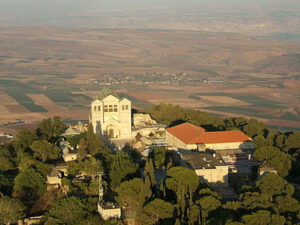
In the second reading, St Paul declares that for many ‘their God is their stomach; their glory is in their shame.' Sounds so contemporary! Indeed, aren’t we anxious about sowing, reaping and gathering into barns? If we think it natural to be ‘occupied with earthly things’, how much more should we be occupied with our supernatural destiny! Being made in the image and likeness of God ‘our citizenship is in Heaven, and from it, we also await a Saviour, the Lord Jesus Christ.’ If anyone else claims to speak words of salvation, be sure their ‘fruits [are] like honey to the throat / But poison in the blood.’ We can’t really stomach them, for we are made for God.
Jesus came into the world with the Good News of Salvation. But alas, the people of Israel were deaf to His message and blind to His miracles. On Mount Tabor, disciples Peter, John and James heard Jesus talking in glory to Moses and Elijah. Jesus’ imminent departure from this world was at the top of the agenda, but at the top of Peter’s mind was just the pleasure of being there on the Mount. When a cloud overshadowed the trio, and they were afraid, the Father’s voice spoke these ineffable words: ‘This is my Son, my Chosen; listen to Him!’
The Transfiguration is a major feast in the Catholic Church; is it the same in our hearts? St Thomas Aquinas considered it to be one of the greatest miracles in that it complemented baptism and showed the perfection of life in Heaven. St Pope John Paul II introduced it as a ‘luminous mystery’ in the Rosary. But does the miracle transfigure us – turn us into something more beautiful and elevated?
On that Mount, Jesus became the visible bridge between God and man; do we act as bridges or as walls in our society? God the Father clearly indicated that His Son’s mission is higher than that of Moses and of Elijah. How far have we taken this message to the people around us?
That God appeared in person and spoke live is proof that ours is not a God of the dead but of the living: Moses and Elijah, who died centuries ago, are seen in the presence of God. It is a vindication of the Eternal Life promised to all who die in the faith. What an awesome God we serve. ‘Now more than ever seems it rich to die’!
God's Grace: go get it this Lent!
The secular world has given Lent a bad name by making it look like a season of deprivation. It has artfully concealed the fact that deprivation is a thing of its own making, the outcome of a sinful existence. Isn’t sin rampant and yet seemingly non-existent? In the modern world shattered by sin, alas, the absence of God’s grace is its greatest deprivation.
Against that sordid background, how soothing a balm is the liturgical season of Lent! We are invited to return to God, to walk in His path, and to savour His mercy and love. We ought to seize these forty days and renew our faith in the God who saves. We can never forget that the Father sent his Son to restore His covenant with the world; and that relationship is still alive. Lent is therefore a time of great hope, joy and thanksgiving.
The first reading on this first Sunday of Lent (Year C) is taken from Deuteronomy (26: 4-10), the fifth book of the Old Testament. The book comprises Moses’ sermons to the Chosen People as they stood on the threshold of the Promised Land, after a long exile in Egypt. These addresses recall Israel’s past and assert the identity of the Israelites; they also recap the laws that Moses had conveyed at Mount Sinai, stressing that their observance was essential to the people’s wellbeing.
In today’s excerpt we see that Moses calls the Israelites to offer their first produce to the Lord of Heaven and Earth to whom everything belongs. How deeply pertinent to our day and age! We too ought to offer the best of ourselves to God. Such acts of praise and thanksgiving would be perfect antidotes to modern man’s tendency to pose as all-knowing and all-powerful. It’s time we reset our priorities and put God first in our lives.

In the second reading, St Paul (Rom 10: 8-13) echoes those thoughts. The Son of God is the Saviour of the World. And, clearly, ‘if you confess with your lips that Jesus is Lord and believe in your heart that God raised Him from the dead, you will be saved.’ Thus, Christian faith is about trusting in God’s omnipresence, omniscience and omnipotence; it is about adhering to the Risen Christ. He invites everyone; ‘the same Lord is Lord of all and bestows his riches upon all who call upon Him.’ So, let every knee bow and every tongue confess that Jesus is Lord.
The Gospel (Lk 4: 1-13) shows how the evil one deplored the truth that Jesus is Lord. He thought it fit to test Him in the wilderness after Jesus had suffered deprivation of food, water, sleep, and human company. He was disappointed on seeing that the Son of Man had ample provision of the Spirit of God. But then, why did the Holy Spirit lead Jesus to be tempted at all! He did so that His victory might be even the greater. And behold His rejoinders: ‘Man shall not live by bread alone but by every word that proceeds from the mouth of God’ – ‘You shall worship the Lord your God, and Him only shall you serve’ – ‘You shall not tempt the Lord your God.’
Here in India, we would call that a ‘tight slap’. Yet, the temptation in the desert was not an isolated incident; it was very much the beginning of Jesus’ struggle with the prince of darkness, and it only ended on Calvary!... And be sure that the evil one is still around, testing you and me in the tangle of our lives. He tempts us with money and comforts, power and influence; it is almost as if the world is in his clutches. He brazens it out in ways unknown to us naïve children of the light! Not even our baptism in Christ protects us from his icy fingers; the first sacrament is rather the start of a hard journey that tests our faithfulness. But why worry when He is there, ‘My refuge, my stronghold, my God in whom I trust’! (Ps 90: 1-2)
This Sunday of Lent let us acknowledge that the battle with forces of evil is an undeniable reality. (Our hearts go out to the people of Ukraine who have been countering the enemy with fortitude – Amen!) We must diligently put on the armour of God, be filled with the Holy Spirit and stand against the wiles of the devil. We have the sacraments, particularly the Eucharist, which will empower us. For our part, we must renounce evil, sin and Satan – and embrace good, grace and God. Let’s go get it this Lent!
From Earth to Eternity
This Sunday’s readings[1], short but powerful, provide an apt runup to Lent that is three days away. While the first and third readings help us reflect on the nature of earthly life, the second puts the spotlight on our eternal destiny.
The Book of Sirach (also called Ecclesiasticus, as it was frequently read in churches) captures some eternal truths. Written two centuries before Christ, by Jewish scribe Ben Sirach, it points to God as the fount of all knowledge. This is pertinent, particularly as we reel under foolish diktats that can trigger a world war. Can there be any doubt that ‘violence covers the mouth of the wicked’? (cf. Prov. 10:11) So, we must beware of those who craftily try and win friends and influence people; since sweet talk masks some people’s intentions, we must wait until they are unmasked by their actions. To know who and when and why, only in God we trust; He alone can discern the workings of the human heart.
For our part, could we examine the nature of our thoughts, words and deeds? If we cannot control our thoughts, let us at least keep guard on our tongues, and our actions will take care of themselves. And what of our relationships? Do we listen more than we speak, or do we pretend to teach what we ourselves need to learn! Our Lord has said, ‘No disciple is superior to the teacher; but when fully trained, every disciple will be like his teacher.’ When we pattern ourselves after the Master, rather than after a local celebrity or star, we grow in self-knowledge and will readily thank God night and day. The Psalm says, ‘It is good to give thanks to the Lord, to sing praise to your name, O Most High; to proclaim your kindness at dawn and your faithfulness throughout the night.’
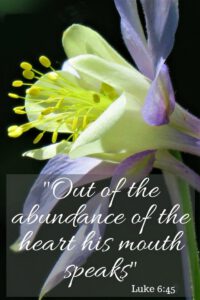
After all, whether we live or die, we belong to the Lord. It behoves us to proceed with humility, gentleness, and patience, and to accept each other with love. And whether trained or not, we are not to look down upon the other, or to try and remove a speck from another’s eye when our own is laden with a bar! We have to particularly mind our tongues; they are mightier than our hands when it comes to breaking a heart. ‘The good man out of the good treasure of his heart produces good, and the evil man out of his evil treasure produces evil; for out of the abundance of the heart his mouth speaks.’ So, let our thoughts, words and actions tell of our relationship with the Lord.
When we as followers of Christ avoid all wrongdoing, we don’t turn passive! On the contrary, we get to focus on our mighty vocation: to build God’s kingdom. Through baptism, we are called to be – like Jesus – priest, prophet and king: to bring others to God and God to others; to give voice to the voiceless, and to use our time and talent for the common good. That is a threefold call to holiness. Needless to say, after having fought the good fight, finished our course, and kept the faith, there will be laid up for us a crown of justice. (cf. Tim 4:8)
Which is why St Paul is not intimated by death: perishable beings turn imperishable, and mortals put on immortality, says he. His treatment of the theme is so engaging that many a play and novel, song and film have celebrated the verse ‘Death is swallowed up in victory / O Death, where is thy victory? / O Death, where is thy sting?’ Particularly striking is John Donne’s sonnet which, while personifying death, humorously yet profoundly argues against its power. And while the sixteenth-century English clergyman and metaphysical poet ends his devotional lyric with a strong prediction: ‘Death, thou shalt die!’; the Apostle of the Gentiles ends his letter with a warm assurance: ‘Be steadfast, immovable, always abounding in the work of the Lord, knowing that in the Lord your labour is not in vain.’ Interestingly, thoughts about that treasure which lies in Heaven can give our life on earth an exciting new direction.
[1] Sir 27:5-8; Ps 91:2-3,13-14,15; 1Cor 15:54-58; Lk 6:39-43
The Challenge of Loving
Today’s readings (Sam 26:2.7-9, 12-13, 22-23; Ps 102, 1-2, 3-4, 8, 10, 12-13; 1 Cor 15:45-49; Lk 6:27-38) present a great challenge to our life of faith: to live as Jesus lived. David’s posture prefigures Jesus’ teaching about mercy and forgiveness, love and compassion. It is an invitation to follow a whole new way of life, even if the world dubs it an impossible dream, or just plain folly.
David was an outstanding general in the army of Saul, the first king of Israel. Envious of his popularity, and seeing him as a threat to his kingdom and dynasty, Saul plotted against David but fell into his hands instead. David and his military leader Abishai literally walked into Saul’s encampment in the dead of night and returned with Saul’s spear and jar of water; they could well have killed him, but David chose not to put forth his hand against the Lord’s anointed. David was indeed a man after God’s own heart.
David’s magnanimous gesture stands as a model of neighbourly love. Jesus, a descendant of the same royal house, twenty-eight generations later, weaves a whole new philosophy about love when he says: ‘Love your enemies, do good to those who hate you, bless those who curse you, pray for those who abuse you.’ No doubt, it sounds crazy to offer the other cheek; to let others take away our goods with impunity, and to be fools for Christ. But as we learn from David, love of God and neighbour is the only perfect formula.
It goes without saying that the Fall has made it difficult for man to put God and others before self. Our slavery to sin is what Jesus wants us to root out; He has shown the way, by dying for our sins. And we, who are unlikely to die on the cross, could we at least carry it with a spirit of loving sacrifice? It is not easy, especially if we depend on our own strength; but with God’s help, it is not impossible.
But how do we do it? By dying to ourselves in the ups and downs of daily life; by showing mercy and love to others; by making a positive sacrifice for the love of God. In other words, He must increase; we must decrease. Or, to paraphrase Padre Zezinho, the Brazilian songwriter and communicator, we have to love as Jesus loved, dream as Jesus dreamt, think as Jesus did, live as Jesus lived; we must feel what Jesus felt, smile as Jesus smiled, and surely at the end of day we will sleep to our heart’s content.
‘The Lord is compassion and love, slow to anger and rich in mercy.’ We are called to be and do the same. According to St Paul, ‘just as we have borne the image of the man of dust, we shall also bear the image of the man of heaven.’ That’s a promise. It is not for us to fret about achieving perfection; it behoves us to only keep trying. Our Father in Heaven, who is rich in mercy and love, knows the vicissitudes of our earthly and spiritual journey. He wants us to make a difference, by loving not only those who love us but to show mercy and love as God does, fully and unconditionally.
If that still comes across as an illusion, or a dream not worth chasing, it is because modern man is so self-absorbed that he thinks of realising himself through self-love, self-interest, self-promotion; it’s a lot about ‘I, me and myself’. What a far cry from the life that God urges us to follow: a life spent in the service of others; a life of prudence, justice, temperance, fortitude, mercy, compassion, faith, hope, and love. This is the real stuff of life, the real challenge; everything else is illusion.
When our God is the Lord!
How many of us sincerely believe that God’s law is a boon? Sometimes, we complain about it, shun it, or even have the temerity to think it a bane. We seem to put our trust and find meaning only in laws that we have devised, when actually they are far from fool-proof.
In contrast, God’s law is a blueprint for happiness; it was always meant to be so. That the Chosen People failed to see it that way and dishonoured their covenants is a different matter. God in His love sent prophets to salvage the situation. One of them was Jeremiah (700 B.C.), who minced no words when he said, ‘Cursed is the one who trusts in human beings, who seeks his strength in flesh, whose heart turns away from the Lord.’ But then, they turned down prophet after prophet, and threw a spanner in God’s plan of salvation.
Felix culpa! It paved the way for the New Covenant. Jesus came into the world as the new Adam, to form a new humanity. He infused new life into the law. He liberated it from false interpretations; he disapproved of sticking to the letter to the detriment of the spirit of the law; he condemned practices that were merely external and ritualistic. What is more, Jesus pointed to what should be at the heart of the law: love of God and love of neighbour. Finally, by his own death and resurrection, He created a covenant of love.
In the course of His earthly ministry, Jesus touched upon the topic of happiness – an ideal very close to the human heart. He wished to show how God’s law can be an instrument of human happiness. St Luke collected Jesus’ thoughts on the subject, titling it ‘Sermon on the Plain’ (corresponding to what St Matthew does, in a more detailed manner, in the ‘Sermon on the Mount’). In a few pithy statements, Jesus points to sets of people that are usually thought to be ‘unhappy’, and he pronounces them happy or blessed.
Jesus’ pronouncements appear contradictory and bewildering: how can the poor, the hungry, the suffering and the reviled ever be idealised? Which of us would like to be in their shoes? It simply goes against the grain, doesn’t it? But the key to the riddle lies in recognising that God does not think as we do; or rather, human ways have long moved away from God’s ways. In the heat of life’s battles, we see distorted images of reality; God in his wisdom sees it right. That’s good enough reason to let ourselves be guided by Him who is the Author of Life, to surrender to Him who is the Master Physician and can fix all problems. If in all humility we do God’s will, the rest will be given unto us: the joy of life and the promise of eternal salvation.
Jesus assures the poor, the hungry, the suffering and the reviled that their troubles will not go in vain. After all, don’t they trust the Lord better than do the rich, the satiated, the merrymakers and the sought-after? Jesus’ “poor” are those who do not covet earthly riches but set their eyes on the treasure that awaits them in Heaven; the “hungry” that He talks about are those who crave for the Bread and Water of Life; they “weep” who are deeply sorry for their sins; and they are “reviled” who side with the truth rather than playing to the gallery.
Jesus follows up the four beatitudes with four maledictions, as though to reinforce what He had couched in milder language. And when the rich, the satiated, the merrymakers and the sought-after understand that they have had their day is when it dawns on us that none can have it both ways. And who knows, maybe the rich, the satiated, the merrymakers and the sought-after were not even at peace with themselves; they only pretended to feel blessed.
Therefore, only they can be truly blessed whose God is the Lord.
(Banner: Church of the Beatitudes, Israel)
A Road Well Taken
Selecting the right path, both literally and figuratively, is the central theme of American poet Robert Frost’s ‘The Road Not Taken’. The poem was prompted by the continual state of indecision faced by an English writer-friend of his. When the two went for walks, his friend always found it difficult to choose a route, and even after all that fuss was over, he sighed over the opportunities missed on the other route.
The poem popped into my mind as I was going through the Mass readings. We have Isaiah (6:1-2A, 3-8), Paul (1 Cor 15:1-11) and Peter (Lk 5:1-11), three Biblical heavyweights. Like Jeremiah last Sunday, they too faltered at first, then made a leap of faith. They received their calls quite differently but, animated by the love of God, they had the same goal in mind. And unlike the man in the poem, they never regretted the road they had taken. In fact, they were convinced, they persevered under trials, and received the crown of life.
Isaiah receives his prophetic call at the feast of Atonement. In the temple, he had visions of the heavenly court. He did not get to see God face to face; he only glimpsed the train of his garment and heard the quake and the smoke – signs of God’s presence. As he heard the angels sing the Sanctus (the same that we now hear at Mass) he began to feel anxious about his sinful state vis-à-vis God’s presence. He anticipated death but instead was healed by the touch of a burning coal. Fired thus with God’s spirit, he gave his fiat: ‘Here I am! Send me!’
Isaiah was ready to go as God’s messenger, and so was Saul after he became Paul. Initially a persecutor of the Christians, Paul’s dramatic encounter with Jesus on the high road to Damascus changed it all. He offered himself without reservation to God’s service. He undertook four missionary journeys and came to be called ‘Apostle of the Gentiles’. And as there were misgivings about Jesus’ death and resurrection, Paul proclaimed it as an undeniable fact and, for him, a life-changing experience. About the Resurrection, which is at the heart of the Christian message, Paul said emphatically that, without it, ‘our faith is futile’.
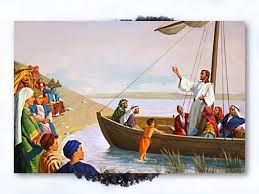
Whereas Isaiah was timid, and Paul who was conceited became humble after his personal experience of God, Simon Peter for his part was a rustic character. Jesus, however, did not look at his intellect but at his heart. A fisherman and unlettered though he was, Jesus made of him a fisher of men. Peter eventually became greater than all men of letters put together, schooled as he was in the knowledge and the love of God. He was in awe of Jesus, and on hearing His soothing words – ‘Do not be afraid. You will catch people from now on’ – Peter and his fellow fishermen James and John left everything and followed Him.
You and I, who are called to live out our baptismal vocation of priest, prophet and king, where do we stand? Do we believe that we should leave everything and follow Him? Or, do we, like the poet, see two paths, unsure which to choose?
Really speaking, Christians have only one path before them: to be messengers of God’s salvation and grace by the apostolate of presence. We are called to be the light of the world and the salt of the earth, such that the temporal is soaked in the Christian spirit. Indeed, we must not let ourselves be blinded by the city lights; we must not be lured by ideologies that lead us astray from the path of truth and justice; we must rather be committed to the only life-giver, Jesus Christ. He is the Way, the Truth and the Life. He shows us the road to Eternal Life. This cannot but be a road well taken.
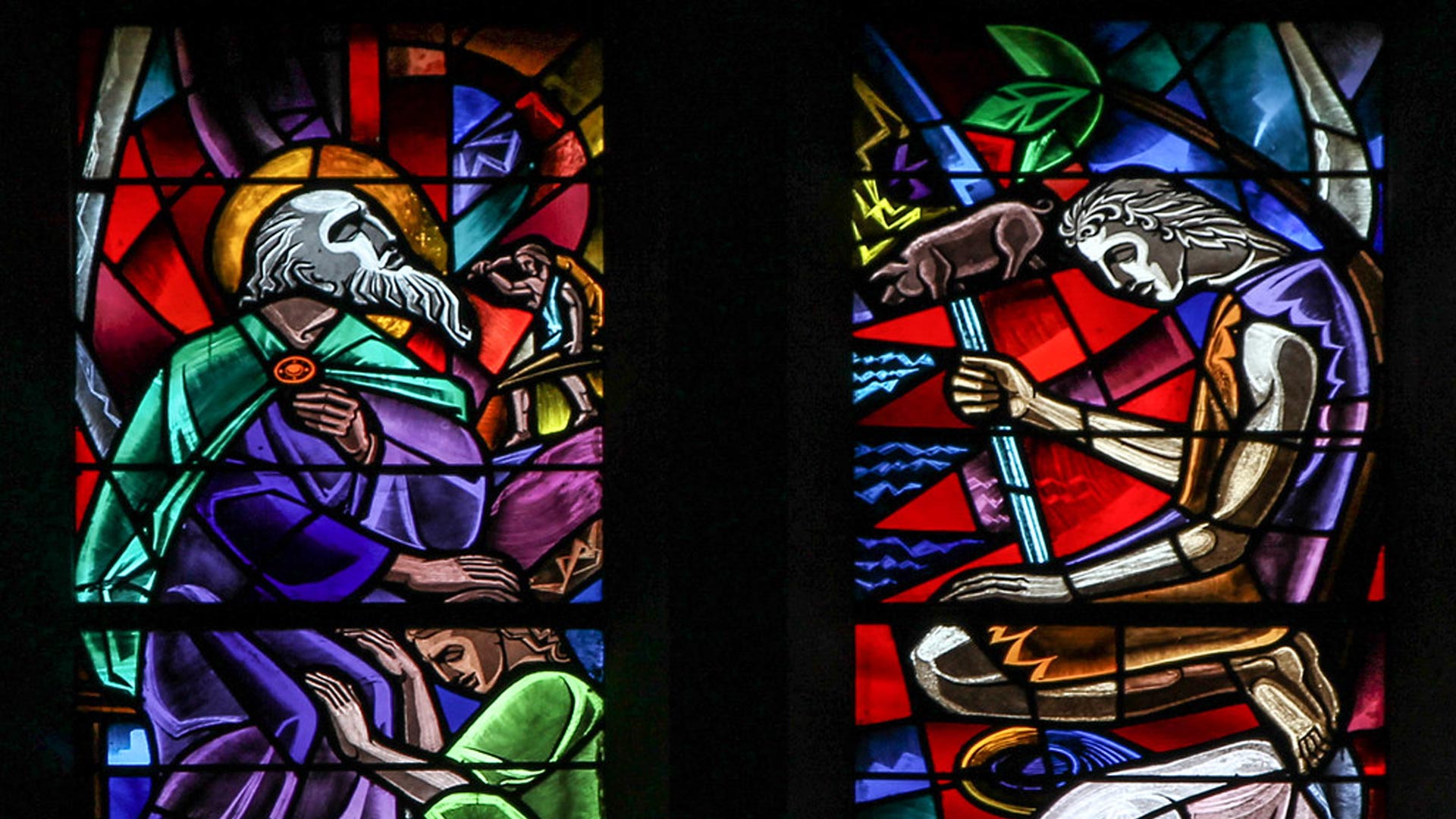

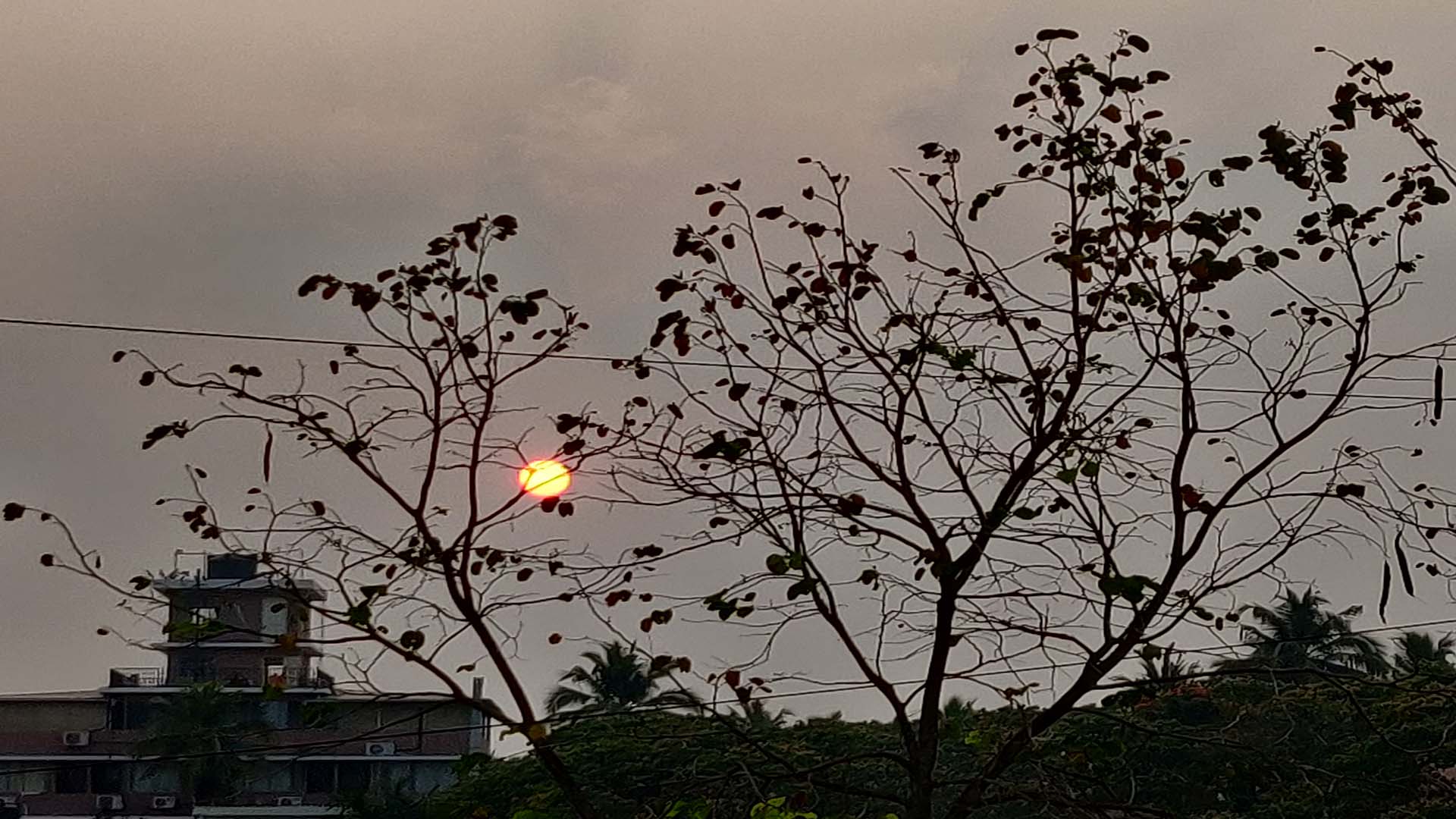
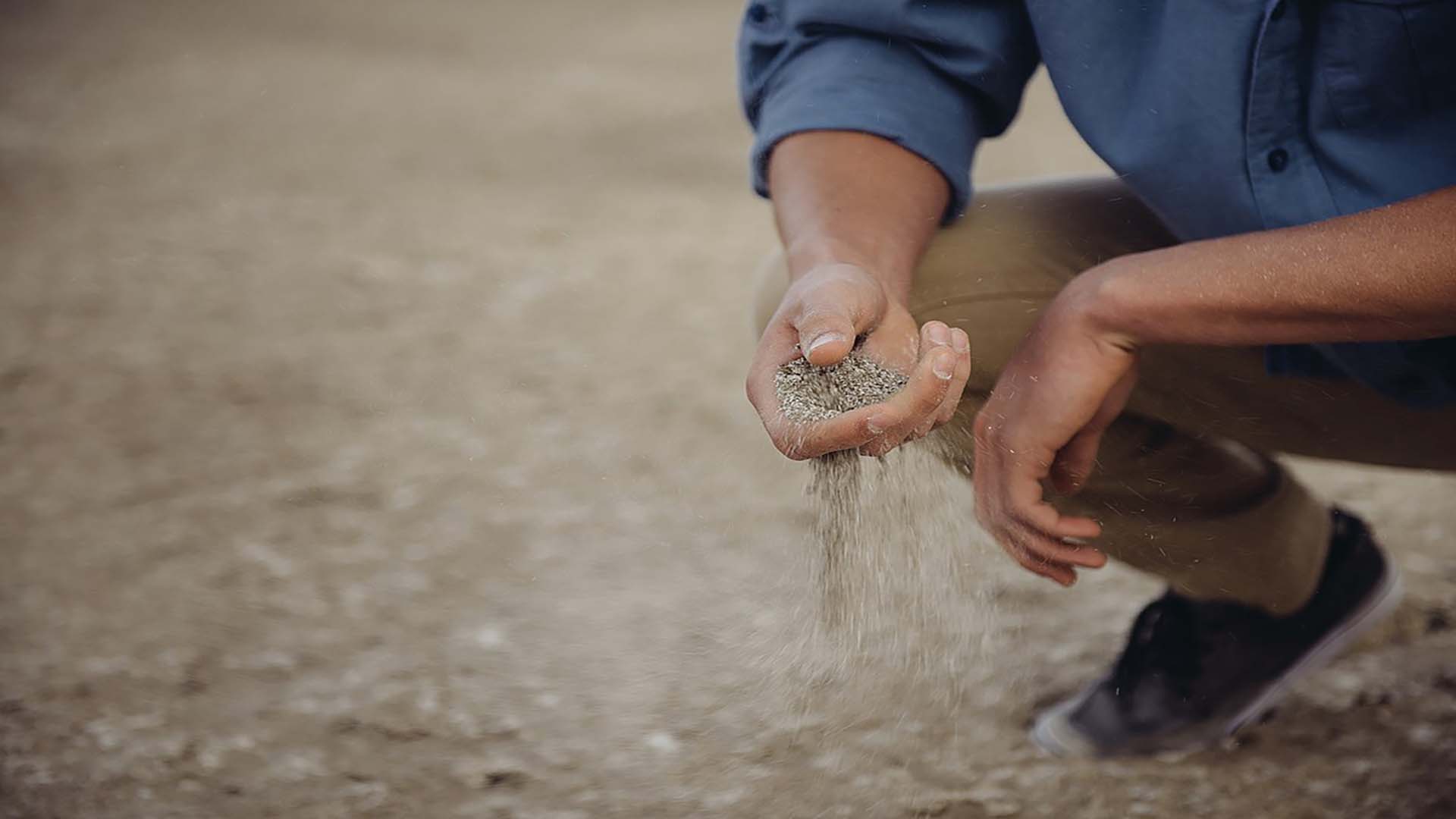
 riram esses prédios rústicos de grande extensão! Mas lá porque foi incorrecto um indivíduo não justifica que seja punida toda a sua classe.
riram esses prédios rústicos de grande extensão! Mas lá porque foi incorrecto um indivíduo não justifica que seja punida toda a sua classe.